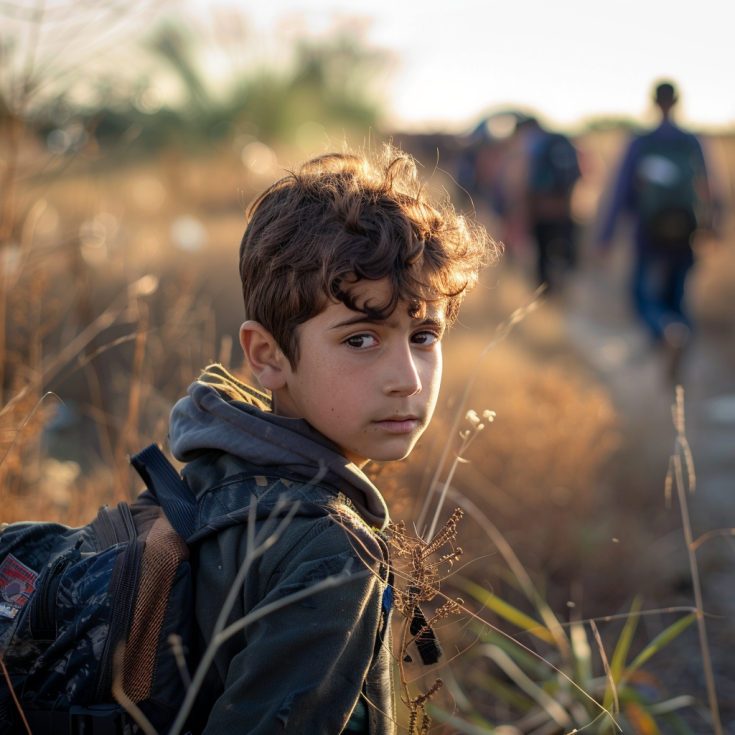Support to unaccompanied minor migrants

Protecting and supporting unaccompanied minor migrants: the Greek case
Between 2014 and 2023, unaccompanied minors accounted for 4.6% of asylum seekers in EU27 (Eurostat). However, there are major disparities between countries. Ratios of more than 10% were observed in this 10-year period in Bulgaria, Sweden, Slovenia, Austria and the non-EU country Norway. During this same period, less than 1% of asylum seekers were registered as unaccompanied minors in other countries: Estonia, Spain, Czechia, France and the non-EU countries Iceland and Montenegro.
The intensity of flows of non-accompanied minors also varies considerably over time. For example, in Germany, their number went from 22,000 to almost 36,000 between 2015 and 2016, and then dropped again to just over 9,000 in 2017. Similarly, almost 13,300 unaccompanied minors applied for asylum in Austria in 2022, against 5,600 in 2021 and 4,900 in 2023.
These peaks are an additional challenge for many European local and regional authorities. They are asked to protect these vulnerable asylum seekers and provide for their basic needs. The needs of unaccompanied children and teenagers are quite different from those of adult asylum seekers, e.g. when it comes to protection from abuse, material and psychological support. This presupposes well-functioning registration, monitoring mechanisms, and procedures to ensure that identified needs are met effectively and rapidly.
Weaknesses in the protection of unaccompanied minors in Greece before 2021
Greece is one of the European countries that has been exposed to severe migrant crises. Peeks in numbers of asylum seekers occurred between 2016 and 2019, and then again in 2023. The number of unaccompanied minors who have applied for asylum has been relatively stable since 2016. Between 2,300 and 2,900 unaccompanied children and teenagers applied for asylum every year.
Researchers from Panteion University carried out a study on unaccompanied minors in 2020, based on interviews with 251 homeless children and 34 professionals working with them. It showed that homelessness was often a result of inadequate referral mechanisms. A large proportion of children were unaware of their rights to special protection. Furthermore, waiting periods for placement in child-friendly accommodation facilities were too long. Some of the key recommendations in the report were to strengthen identification and registration mechanisms, provide better information to unaccompanied minors and allocate sufficient resources to meet their basic needs.
An innovative solution: the National Emergency Response Mechanism
The regulatory framework for public policies targeting unaccompanied minors in Greece changed in December 2020, with the adoption of a law that abolished the possibility to detain unaccompanied children under the pretext of ‘protective custody’. As part of the implementation of this law, emergency accommodation facilities adapted to the needs of children and teenagers were established.
These accommodation facilities were one of the components of the National Emergency Response Mechanism (NERM), which was launched in 2021 with co-funding from the EU. The NERM has made it possible to establish a more effective tracing and referral mechanism. Furthermore, coordination between actors involved in protecting unaccompanied minors has increased. This includes the asylum services, hospitals, municipalities and the police, in addition to the NGOs that run mobile units that trace and accompany homeless children. This led to improved access to psychological, legal, and medical support, as well as access to interpretation services. The essential needs of unaccompanied minors are met more effectively.
The procedure to place children in safe accommodation has been simplified. This makes it possible to get homeless children and teenagers off the streets faster.
The Greek National Special Secretariat for the Protection of Unaccompanied Minors (SSPUAM) and the UNHCR jointly established a 24-hour helpline as part of this mechanism. By contacting this line, unaccompanied children can obtain guidance or immediate protection if they are exposed to risks of trafficking, exploitation or abuse. The line also helps local and public authorities find emergency accommodation.
Experience from NERM demonstrates the benefits of well-designed tracing and referral mechanisms, and of better coordination between actors involved in the protection of unaccompanied minors. In March 2023, the UNHCR found that the mechanism had effectively contributed to the early identification and safe accommodation of 3,258 unaccompanied children.
The concrete solutions that have been implemented could be transposed to many other European contexts and help ensure that the essential needs of all unaccompanied children and teenagers are met.